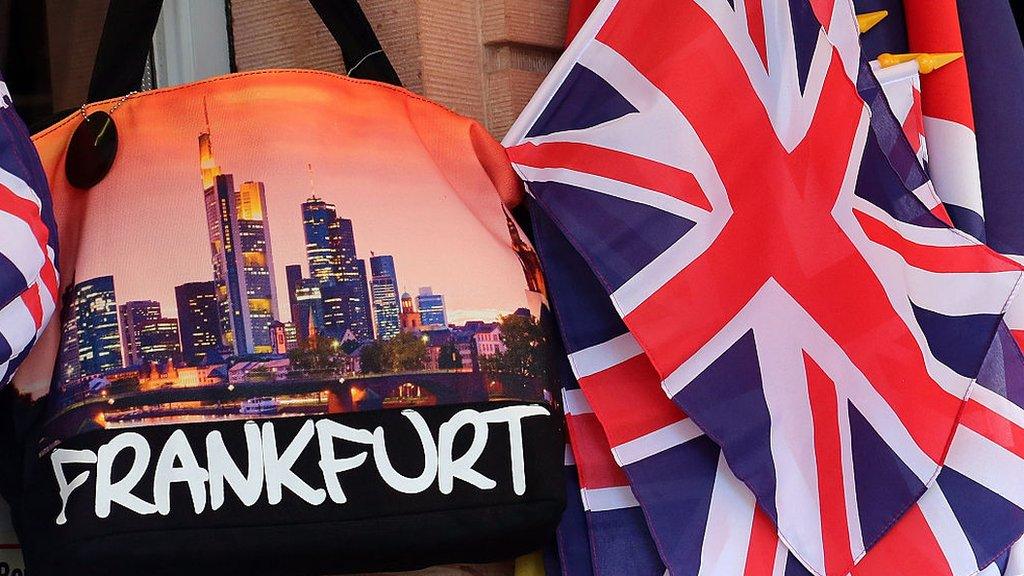Prospect of Brexit bemuses and worries Germany
- Published
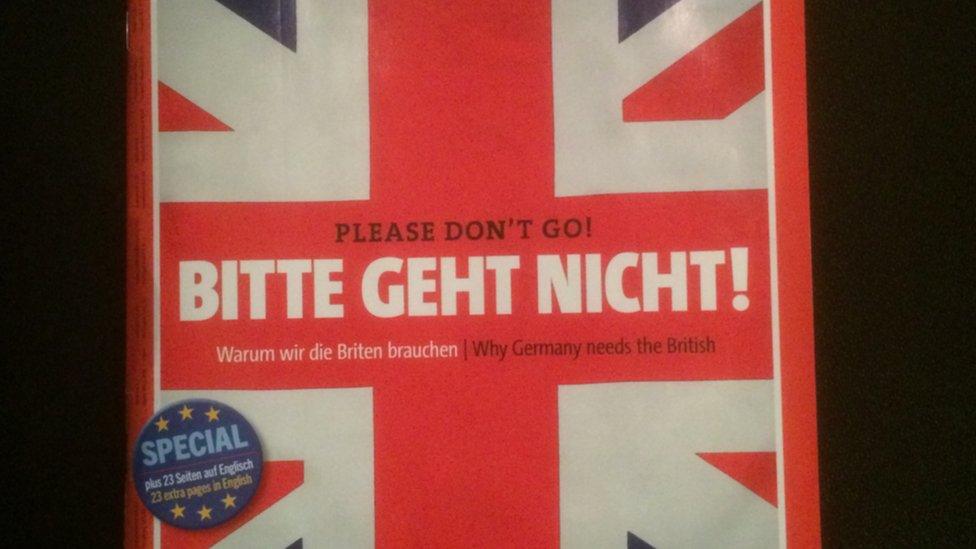
Der Spiegel makes its position plain
"Please don't go!"
This week's edition of the influential news magazine Der Spiegel, external is a beseeching entreaty in red, white and blue.
Covered in a union jack and printed in English and German, the publication is dedicated to the referendum debate.
Der Spiegel is unambiguously opposed to a Brexit: "The only internationally known politician in favour of a Brexit,' its editors write, 'is Donald Trump - and, if nothing else does, that alone should make the British worry."
The majority of Germans apparently agree; earlier this month a poll revealed 79% don't want Britain to leave, external the EU.
For months many here have been bemused, perplexed and downright concerned by the notion that Britain might want to leave.
The Germans hoping Britain stays in the EU
Germany conflicted on how to handle Brexit
German power is the real key to Europe
EU referendum: All you need to know
In the words of one of Angela Merkel's senior conservatives: "David Cameron is like the sorcerer's apprentice. He doesn't know what he's started."
But, with just over a week to referendum day, the German press are happy to lay bare their version of how it could finish.
A Brexit, Spiegel predicts, would be "a threefold catastrophe: bad for Germany, bad for Britain and cataclysmic for Europe."
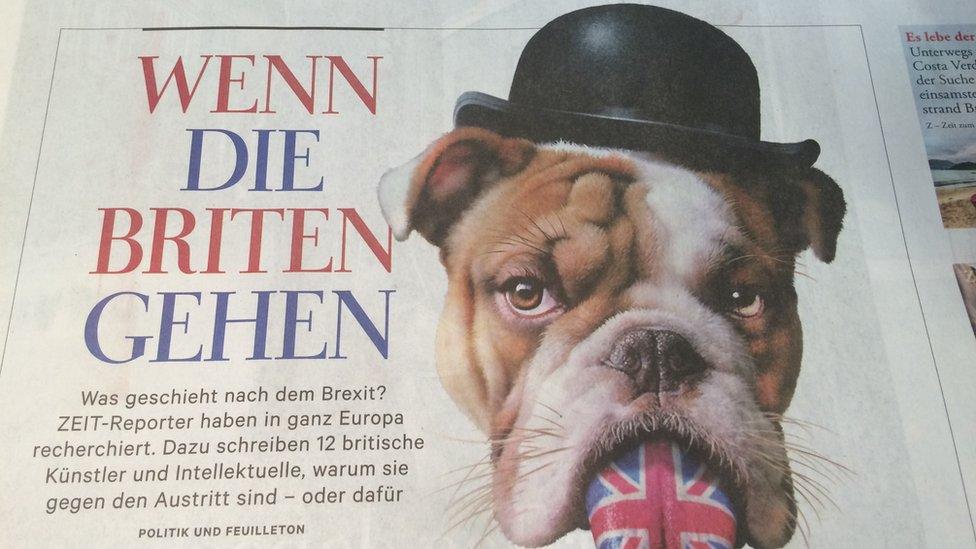
If the British Go: Die Zeit considers Brexit
The newspaper Die Zeit envisages a doomsday Brexit scenario. Panic at the London stock exchange, a scramble among Europe's leaders to maintain a united front, a party for Marine le Pen and independence for Scotland. Great Britain, the newspaper predicts, will be flying blind.
Europe is jittery. For the first time, yields on 10-year German government bonds have fallen below zero.
And the real possibility that Britain may vote leave has generated a palpable sense of alarm in Berlin.
Which explains Angela Merkel's recent intervention in the referendum debate.
She and her advisors have been wary of doing so; they are keenly aware that British voters and commentators could (and some did) interpret any public comment as interference. And they don't wish to unwittingly boost the Leave campaign.
Mrs Merkel's language was careful and muted. Her short statement carefully timed and co-ordinated with Downing Street. But it contained a stark warning; if Britain opts out, it will lose its bargaining power with the EU.
Her finance minister was less diplomatic. "Out is out,", external said Wolfgang Schauble.
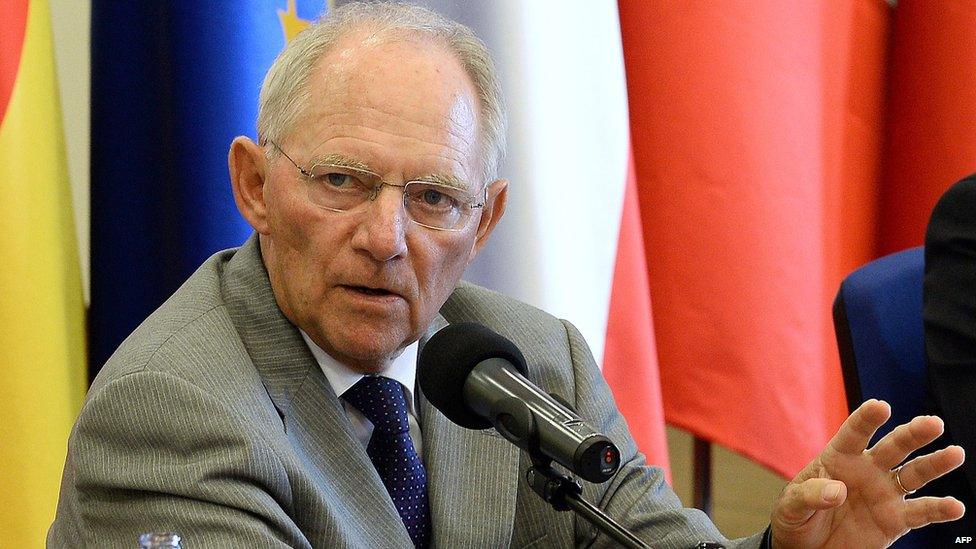
Wolfgang Schauble takes a tough line on Brexit
A Britain outside the EU could forget access to the single market, he said, ruling out the kind of trading relationship held by Norway or Switzerland.
"That won't work," he said. "It would require the country to abide by the rules of a club from which it currently wants to withdraw."
Far less well publicised was what a senior German CDU MP told Der Spiegel.
Juergen Hardt, the party's foreign policy spokesman, offered an intriguing glimpse into how Berlin may be preparing for Brexit.
If the UK votes to leave, Mr Hardt said, then the EU should gauge possible action to prevent a British exit from becoming a reality. Brussels shouldn't close the door right away.
One way or another, Germany wants to keep Britain close.
Why?
There are the obvious reasons; within Europe, Britain is a powerful economic and political ally for Germany. Without Britain, some here worry that Germany will be perceived as too big, too dominant within the union.
The two countries are important to each other commercially; the UK is Germany's fifth most important trading partner.
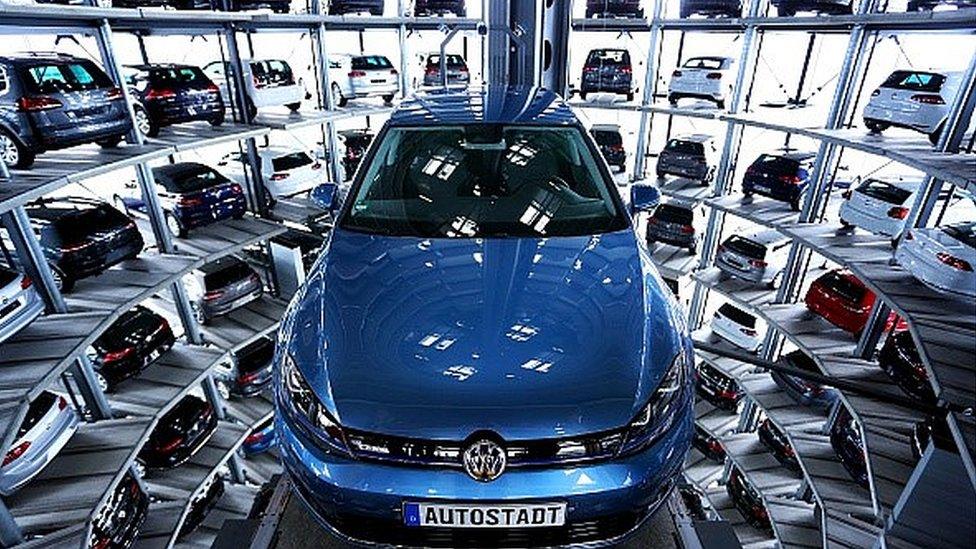
German cars are popular in the UK
Take the car industry: last year Germany sold 810,000 cars to the UK - around a fifth of the total number it exports worldwide.
And German companies manufactured 216,000 cars in the UK, according to the head of the German car makers' association.
Matthias Wissman has repeatedly warned of the negative impact a Brexit would have on the entire industry.
And there is a wider concern in Berlin. As one senior MP put it: "Brexit would be a catastrophic and disastrous message to the rest of the world that Europe doesn't work and can't stick together."
Merkel's future
As one commentator put it, part of the reason Angela Merkel supported David Cameron's efforts to renegotiate a relationship with the EU is that she does not want to go down in history as the German chancellor under whom Europe fell apart.
Angela Merkel makes no secret of her commitment to the European project.
The degree to which a Brexit might encourage other countries to follow suit is difficult to quantify.
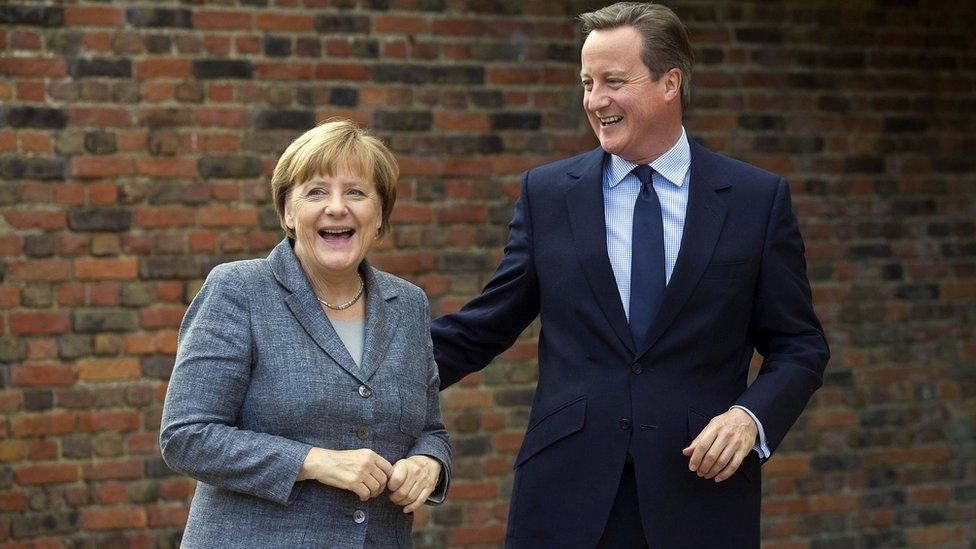
Angela Merkel supported David Cameron's negotiations for a better deal for the UK
But it is clear that populism and anti-EU sentiment are changing Europe's political landscape - fuelled in part by the refugee crisis.
Last month, a YouGov poll revealed that, in the event of a referendum here, nearly one in three Germans would vote to leave the EU., external
That is surprising in a country where, it is often said, people identify as European first, German second.
There is a general election in Germany next year.
Angela Merkel has yet to announce whether she will stand but it's widely believed that she will.
Her Christian Democrats are likely to lose votes to the party Alternativ Fuer Deutschland.
It has positioned itself as anti-Islamic and wants more power for national governments within Europe.
There is a lot of stake for the Merkel administration.
But there is another force driving those who want Britain to stay.
As one commuter sitting in the sunshine outside Berlin's main railway station put it: "Great Britain is doing what they think is best for them. I like the British, I like London. I'm sure the Brits will do the right thing."
There is, among Germans, a genuine affection for Britain.
As those Spiegel editors write: "Germany has always looked across the Channel with envy… (Brits) have an inner independence that we Germans lack."
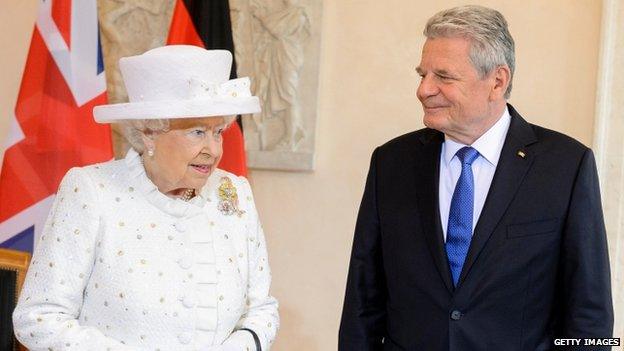
The Queen met President Gauck last year
That affection was perhaps most in evidence here last summer during the Queen's visit to Berlin (the British Royal Family is hugely popular here) when German television went into royal overdrive and crowds turned out to greet the British monarch.
During that visit, both the Queen and the German president appealed for European unity and made reference to World War Two through which they both lived.
"The European Union needs Britain," said Joachim Gauck.
"A united Europe, a strong European Union represents stability, peace and freedom for us all."
It is a narrative which underpins discussions here because, fundamentally, for many Germans, that's still what the EU is all about.
At times there is frustration at the level of the debate in Britain. Boris Johnson's likening of the EU's aims to those of Hitler irritated many Germans.
And Iain Duncan Smith's claims that "the Germans" had, in effect, bullied David Cameron over his renegotiations infuriated the government.
There is an acceptance here that Britain's perspective on the EU has always been markedly different.
And there is a consensus that, without that perspective, Europe would be a poorer place.

Chancellor Angela Merkel on the EU referendum:
"Obviously, it is up to the citizens of the UK themselves how they wish to vote in the upcoming referendum. I've said repeatedly before that I personally would hope and wish for the UK to stay part and parcel of the EU."
"We work well together with the UK particularly when we talk about new rules for the EU. We have to develop those together with the UK and whenever we negotiate that, you can much better have an influence on the debate when you sit at the bargaining table and you can give input to those negotiations and the result will then invariably be better rather than being outside of the room."
"It would not only be in our interest but it could also be in the interest of Britain when it can bring its whole political weight to the negotiating table as part and parcel of the EU." (Speaking at joint news conference with Nato Secretary General Jens Stoltenberg in Berlin, 2 June).

- Published2 June 2016
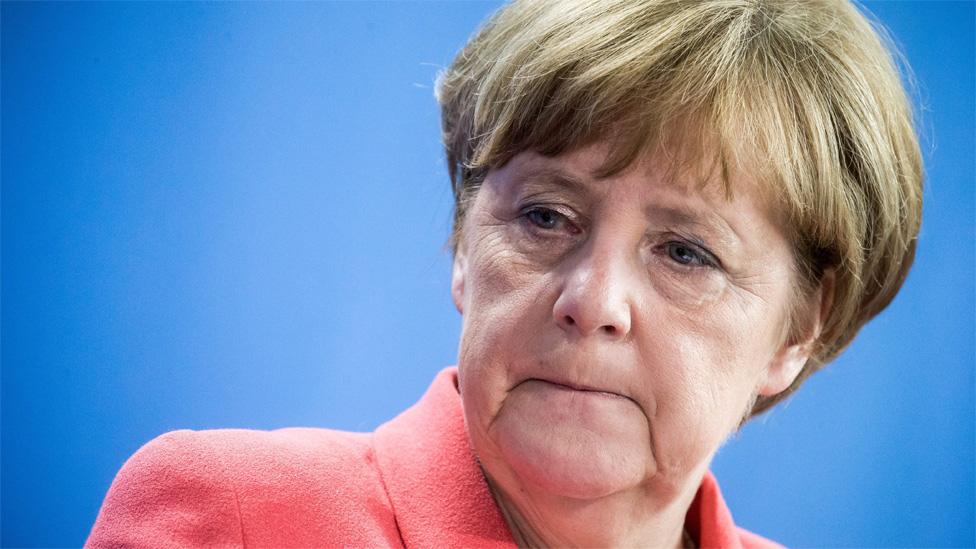
- Published2 June 2016
- Published8 June 2016

- Published10 May 2016
